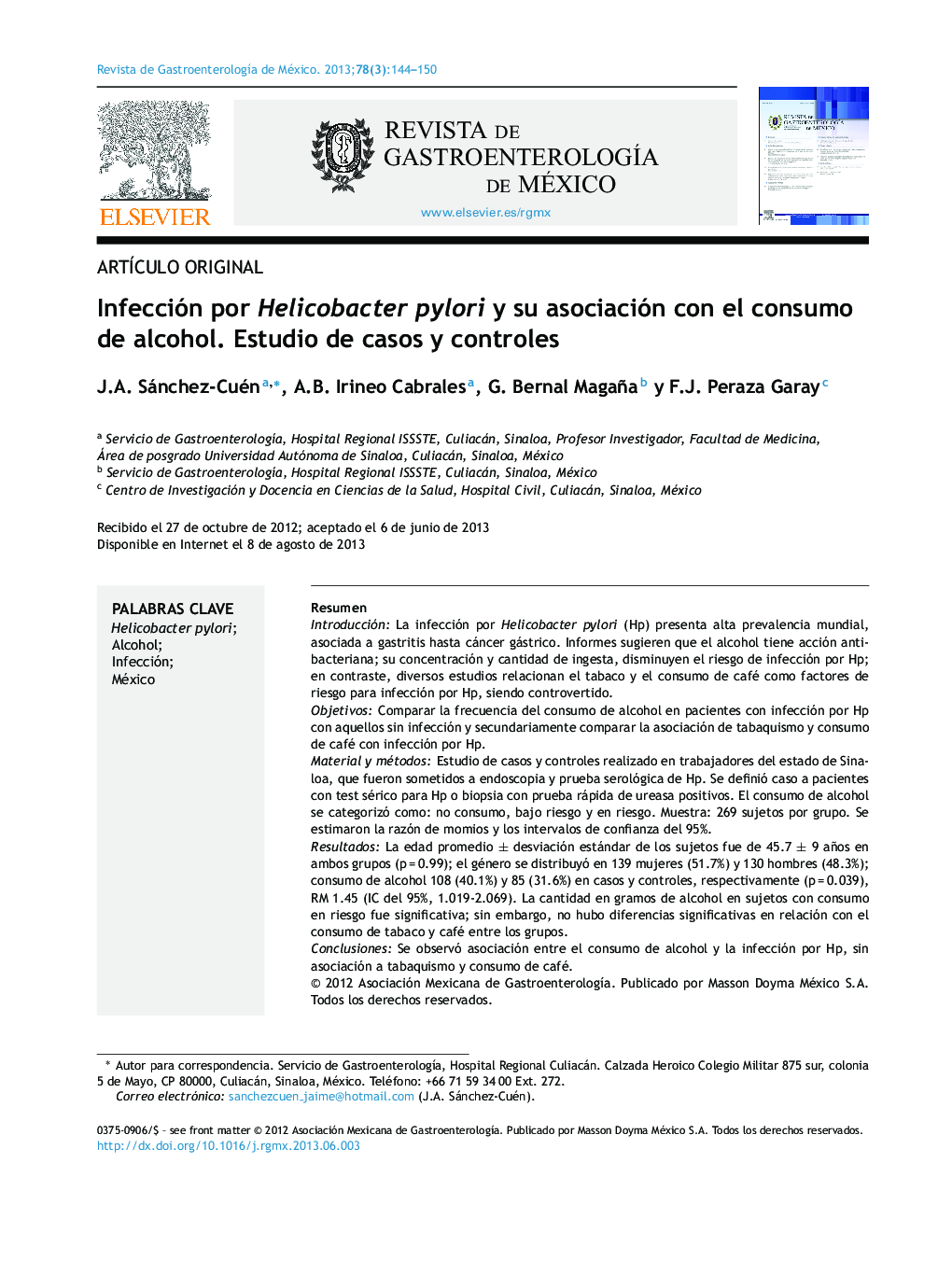| Article ID | Journal | Published Year | Pages | File Type |
|---|---|---|---|---|
| 3318826 | Revista de Gastroenterología de México | 2013 | 7 Pages |
ResumenIntroducciónLa infección por Helicobacter pylori (Hp) presenta alta prevalencia mundial, asociada a gastritis hasta cáncer gástrico. Informes sugieren que el alcohol tiene acción antibacteriana; su concentración y cantidad de ingesta, disminuyen el riesgo de infección por Hp; en contraste, diversos estudios relacionan el tabaco y el consumo de café como factores de riesgo para infección por Hp, siendo controvertido.ObjetivosComparar la frecuencia del consumo de alcohol en pacientes con infección por Hp con aquellos sin infección y secundariamente comparar la asociación de tabaquismo y consumo de café con infección por Hp.Material y métodosEstudio de casos y controles realizado en trabajadores del estado de Sinaloa, que fueron sometidos a endoscopia y prueba serológica de Hp. Se definió caso a pacientes con test sérico para Hp o biopsia con prueba rápida de ureasa positivos. El consumo de alcohol se categorizó como: no consumo, bajo riesgo y en riesgo. Muestra: 269 sujetos por grupo. Se estimaron la razón de momios y los intervalos de confianza del 95%.ResultadosLa edad promedio ± desviación estándar de los sujetos fue de 45.7 ± 9 años en ambos grupos (p = 0.99); el género se distribuyó en 139 mujeres (51.7%) y 130 hombres (48.3%); consumo de alcohol 108 (40.1%) y 85 (31.6%) en casos y controles, respectivamente (p = 0.039), RM 1.45 (IC del 95%, 1.019-2.069). La cantidad en gramos de alcohol en sujetos con consumo en riesgo fue significativa; sin embargo, no hubo diferencias significativas en relación con el consumo de tabaco y café entre los grupos.ConclusionesSe observó asociación entre el consumo de alcohol y la infección por Hp, sin asociación a tabaquismo y consumo de café.
IntroductionThere is a high prevalence worldwide of Helicobacter pylori (Hp) infection associated with gastritis and extending to gastric cancer. Reports have suggested that alcohol has antibacterial action and that its concentration and the amount consumed reduce the risk for Hp infection. In contrast, different studies suggest that tobacco and coffee consumption are risk factors for Hp infection, but their results are controversial.AimsTo compare the frequency of alcohol consumption in patients infected by Hp with that of non-infected subjects and, as a secondary aim, to compare the association of smoking and coffee consumption with Hp infection.Material and methodsA case-control study was conducted on Sinaloa State workers that underwent endoscopy and the Hp serology test. Cases were defined as patients with a positive Hp serology test or a positive biopsy with the rapid urease test. Alcohol consumption was categorized as: no consumption, low-risk, and at-risk. The sample included 269 subjects per group. Odds ratio (OR) and 95% confidence interval (CI) were calculated.ResultsIn both groups, the mean age of the subjects was 45.7 (SD: 9) years (P=.99), 139 of the subjects were women (51.7%) and 130 were men (48.3%); alcohol consumption was present in 108 (40.1%) and 85 (31.6%) of the cases and controls, respectively (P=.039), OR 1.45 (95%CI 1.019-2.069). The quantity of grams of alcohol in subjects with at-risk consumption was significant; However, there were no significant differences in relation to smoking and coffee consumption between the groups.ConclusionsAn association between alcohol consumption and HP infection was observed and no relation with HP infection was found with respect to smoking and coffee consumption.
